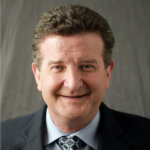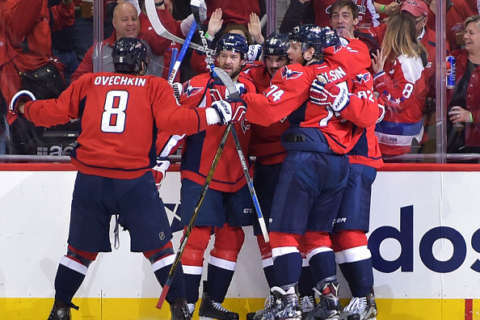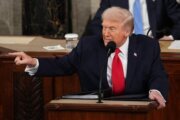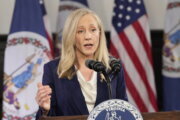For 30 years, Craig Laughlin has been welcomed in D.C.-area homes as an analyst for Washington Capitals television and NBC Sports Washington, mixing his natural optimism with frank honesty.
Given Laughlin’s personality, it is encouraging that he believes the NHL will resume play at some point this summer, and the Capitals can continue their quest for a second Stanley Cup.
When the NHL suspended its season March 12, the Capitals were one point ahead of the Flyers for first place in the Metropolitan division.
The Athletic’s Pierre LeBrun reported earlier this week that the NHL and its players are inching closer to a return-to-play format that will include 24 of the league’s 31 teams playing some regular season games before the start of the Stanley Cup Playoffs.
The games would take place at still-to-be-determined neutral sites without fans.
“I think the games will be played in four cities,” Laughlin said. “I think it’s going to be maybe five or six regular season games and then right into a playoff format that will be different than the past in the first round. But then I think we go through August. We take off in September and October and then don’t start next season until November or December.”
If the NHL is able to resume its season, presumably in July, then that means players would have to start reporting back to their teams by at least June or in a little over a week.
Players from overseas have to get back in the country, and in the case of the Capitals, it is still to be determined by local authorities if they can hold practice at their training facility in Arlington or have to find another place to prepare for a resumption of the season.
“When the NHL does come back, they are going to have an extended training camp of about three weeks,” Laughlin said. “Running, biking, Pelotoning, working on stretching, yoga, all that stuff is fine and dandy, but they’ve got to get their skating legs, skating muscles firing and working; and I think that’s going to take about three weeks. That’s why that training camp in June is going to be of utmost importance.”
Despite the Capitals’ success this season, they have also been inconsistent. Their first-place standing is built on the foundation of a strong early season.
Since the end of December to when play stopped in March, the Capitals were barely above .500 with a record of 15-14-3.
“I have seen them play some outstanding hockey this season, but I’ve also seen them play some real poor hockey,” Laughlin said. “There’s sort of nothing in between with this team. They are either firing on all cylinders, or they’re not so good and they seem to have lost their way playing the game of hockey. But when it comes down to crunch time, they now have experience. They have taste of the Stanley Cup, and they are going to be at their best.”
Another motivating factor for the Capitals this summer is what happened last spring.
The Capitals were well positioned in 2019 to repeat as Stanley Cup champions but were stunned in the first round of the playoffs. After winning the first two games of their series with the Carolina Hurricanes, the Capitals struggled and then were eliminated in an overtime loss in the decisive game.
“I think they are hungry and I think they felt they let that slip,” Laughlin said. “I really believe that they had a chance to go back-to-back (Stanley Cup champions), and they ran into a very good hockey team in Carolina, and one shot, as we know it, wins in overtime. I think that sort of set them on their way this season to change their philosophy. The Caps wanted to play that fast, in-your- face style, and they did that, I think, in a big part because of the loss to Carolina and the way they played.”
In addition to his work on Capitals broadcasts on NBC Sports Washington, Laughlin is active in developing hockey players through his program Network Hockey.
Here are some tips for stay-at-home hockey players.
Stay active
“I think it’s important to also have habits and routines during the day. It is a big change for just about every kid in the DMV as far as no school — which means no recess, which means no athleticism and classes and stuff like that. To me, it’s about staying active, and it’s about playing other sports like tennis and soccer outside by yourself or with one friend or a family member, not in huge groups as we know it.
Grab your stick and more
“Roll your wrist. Roll a puck on the driveway. You can use a golf ball, which is great. Work on your stick handling without watching the ball. Especially young kids often look down at the puck. Keep your head up. This is a time to improve without anybody watching.
Use anything in your house. You don’t have to go out and get stuff; use what’s available. If you’re doing some weight stuff, use body weights, pushups, situps, stretching — all important for the maturity of these young athletes that are chomping at the bit to get back to our great game.”
In-line skate
It’s a little different stride than skating on the ice. I think that if you do some Rollerblading, it can transfer to hockey. The NHL players are doing it, so why not try some rollerblading? But be safe; wear a helmet.”
More than hockey
“Use this time to get better in a lot of things. It doesn’t have to be sports. Read more. Get involved and don’t just play video games. Go out, get active, walk, run, jog sprint — because it will carry over once hockey does come back. “
- Coronavirus FAQs: What you need to know
- Latest coronavirus test results in DC, Maryland and Virginia
- From Sweden with love: How Calle Johansson keeps up with the Caps amid coronavirus
- An unusual ring to it: Nats opt for virtual Series ceremony
- Column: Just like in Sept. 2001, Michael Jordan is helping us get through a crisis
- Sign up for news alerts from WTOP
Looking for more information? D.C., Maryland and Virginia are each releasing more data every day. Visit their official sites here: Virginia | Maryland | D.C.






